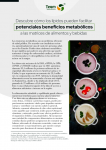Study links trans fat intake to depression
The study, based on results from the SUN Project – consisting of over 12,000 Spanish volunteers – found that participants with the highest level of trans fat consumption had up to a 48 per cent increase in the risk of depression compared to those who did not consume these fats.
Published in the open access journal PLoS ONE, the research also found that polyunsaturated and monounsaturated fats, in addition to olive oil were associated with lower incidence of depression.
The researchers, led by senior authort Miguel Martínez, Professor of Preventive Medicine at the University of Navarra, Spain,noted that the current research was carried out on a population with a relatively low trans fat intake of only 0.4 per cent of total energy.
“Despite this, we observed an increase in the risk of suffering depression of nearly 50 per cent,” said Prof. Martínez.
“On this basis, we derive the importance of taking this effect into account in countries like the U.S., where the percentage of energy derived from these foods is around 2.5%,” he added.
Trans fats
Though trace amounts of trans fats are found naturally, in dairy and meats, the vast majority are formed during the partial hydrogenation of vegetable oil (PHVO) that converts the oil into semi-solids for a variety of food applications.
Trans fats are attractive for the food industry due to their extended shelf life and flavour stability, and have displaced natural solid fats and liquid oils in many areas of food processing.
But scientific reports that trans fatty acids raise serum levels of LDL-cholesterol, reduce levels of HDL-cholesterol, can promote inflammation can cause endothelial dysfunction, and influence other risk factors for cardiovascular diseases (CVD), has led to a well-publicized bans in New York City restaurants, and other cities, like Chicago.
In the food industry this has been mirrored by an increase the in pressure on food manufacturers to reduce or remove trans fatty acids from their products and reformulate.
The new study suggests that trans fats may also be associated with an increased risk of depression.
Dietary depression
In 2004, depression was the third leading cause of Disability Adjusted Life Years (DALY's) in the world and the main cause in middle and high income countries.
Wide variations exist in the prevalence of depression across countries, which the authors said may due to differences between countries in some of the major risk factors for mental health.
They suggested that between-country differences in food habits could – at least in part – account for such differences, adding that epidemiological evidence “is accruing in recent years to support a relationship between improved nutrition and better mental health.”
Martínez and colleagues also noted that the rising incidence of depressive disorders is paralleled by “a dramatic change in the sources of fat in the Western diet.”
“This change mainly consists in the replacement of polyunsaturated (PUFA) or monounsaturated fatty acids (MUFA) by saturated fats (SFA) and trans unsaturated fats (TFA) … In consistency with this trend, the so-called “Western” food pattern (rich in SFA and TFA and common in Northern Europe and USA) has been reported as a relevant risk factor for depression,” they wrote.
They said that beyond adherence to an overall dietary pattern, very little is known about the effect of specific types of major fat sources for the risk of depression risk.
Olive oil and other PUFAs are generally considered as healthy lipids, whilst saturated and trans fats are known risk to be factors for several chronic diseases.
With the exception of omega-3 fatty acids – which were recently suggested to be beneficial for depression – the influence of other fatty acids and fat subtypes on depression risk has received only little attention.
The new study assessed the role of dietary fat subtypes on depression occurrence in a Mediterranean prospective cohort.
Study details
The study analysed data from 5,038 men and 7,021 women, with an average age of 37.5 years, recruited through the ‘Seguimiento Universidad de Navarra’ (SUN) Project
A direct potentially harmful association between trans fat intake and the risk of depression was found by the researchers. They reported that the magnitude of this association was “robust and persisted after several degrees of control for confounding and several sensitivity analyses.”
In addition the analyses also reported an inverse dose-response relationship for total monounsaturated and polyunsaturated fat intake and depression, whilst a (weaker) inverse association between olive oil consumption and depression was also found.
“Our results showed a protection of cardioprotective fats (PUFA and MUFA) and a detrimental effect of TFA on depression risk,” said the researchers.
They added that the findings from the study suggest a possibility that cardiovascular disease and depression share some common nutritional determinants, related to subtypes of fat intake.
However, Martínez said that the studies findings would need to be confirmed with further prospective studies and trials.
Source: PLoS ONE
Published online ahead of print, doi: 10.1371/journal.pone.0016268
“Dietary Fat Intake and the Risk of Depression: The SUN Project”
Authors: A. Sánchez-Villegas, L. Verberne, J. De Irala, M. Ruíz-Canela, E. Toledo, L. Serra-Majem, M.A. Martínez-González














